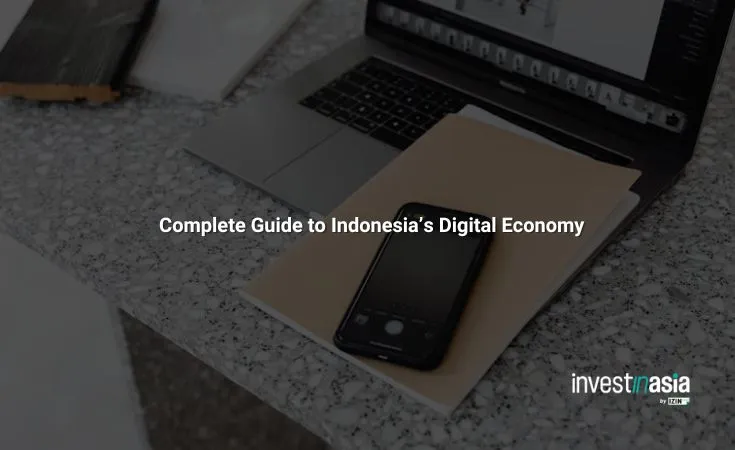Indonesia is Southeast Asia’s digital powerhouse. With a digital market worth $90 billion in 2024 and projections of $130–146 billion by 2025, the country drives nearly half of the region’s online economy.
A young, tech-savvy population and rapid internet adoption have turned Indonesia into a fertile ground for e-commerce, fintech, and digital innovation.
Market Overview and Growth Trajectory
Indonesia’s digital economy grew more than fourfold between 2017 and 2021. With internet penetration at nearly 80% and more than 212 million users, the nation is one of the fastest-growing online markets in the world. Analysts project a compound annual growth rate (CAGR) of 19–22% until 2025.
Also read: Major Industries in Indonesia (Based on Contribution to GDP)
Key Sectors Driving Growth


E-Commerce Expansion
E-commerce dominates, led by Shopee, Tokopedia, Blibli, and Lazada. By 2025, the sector could reach $94 billion. Growth is powered by mobile-first transactions, digital payments, and a rising middle class.
Also read: Top 10 Biggest E-commerce Companies in Indonesia
Fintech Innovation
Indonesia’s fintech ecosystem has grown from 51 players in 2011 to over 330 today. Digital wallets, peer-to-peer lending, and neobanking thrive due to the country’s large unbanked population. QRIS payments unify all wallets and banks, recording 6.1 billion transactions in 2025.
Also read: 10 Top Fintech Companies in Indonesia
Startup Ecosystem
With 2,500+ startups and eight unicorns, Indonesia ranks fifth globally. The ecosystem spans transportation, logistics, finance, and e-commerce. Strong funding flows and government-backed policies strengthen this innovation hub.
Also read: Top Unicorn Startup Companies in Indonesia
Digital Infrastructure and Government Support
Connectivity Investments
The government’s Palapa Ring project provides nationwide fiber-optic coverage, while SATRIA-1 brings internet to rural areas. However, 5G still covers less than 10% of the population, leaving a digital divide between urban and remote areas.
Policy Initiatives
- Making Indonesia 4.0: Digitally enabled manufacturing roadmap.
- Digital Indonesia Roadmap (2021–2024): Focus on infrastructure and MSME integration.
- National Digital Strategy 2030: Aims for leadership in ASEAN’s $2 trillion digital economy by 2030.
Also read: Tax Incentives for Startups and Digital Businesses in Indonesia
Challenges and Barriers


Cybersecurity Risks
Cybercrime remains a pressing issue. Indonesia recorded over 361 million cyberattacks in 2023, with data breaches and identity theft dominating cases.
Skills Gap
By 2030, the nation is expected to lack around 9 million skilled ICT workers. Bridging this gap requires new education models and corporate training programs.
MSME Digitalization
While MSMEs account for 61% of GDP, only 17.5 million out of 64.2 million are digitally active. Access to credit, infrastructure, and training remain obstacles.
Also read: 10 Challenges of Doing Business in Indonesia
Regional and Global Position
Indonesia commands 42% of ASEAN’s digital economy, shaping cross-border policies under DEFA and leading QRIS adoption across Southeast Asia. Globally, it ranks sixth in startup ecosystem development, ahead of many emerging markets.
The following is a comparison table of Indonesia’s digital economy and other ASEAN countries:
| Country | Digital Economy Value (2025 est.) | Share of ASEAN Market | Internet Penetration | 5G Coverage | Startup Ecosystem Rank (Global) | Key Strengths |
|---|---|---|---|---|---|---|
| Indonesia | $130–146B | ~42–44% | 79.5% (212.9M users) | 8.9% pop. | 5th | E-commerce dominance, fintech adoption, largest consumer base |
| Singapore | $20–25B | ~8% | 92% | >70% pop. | 8th | Fintech hub, cross-border payments, strong regulations |
| Vietnam | $35–40B | ~12% | 78% | 12% pop. | 54th | Gaming, e-commerce growth, young workforce |
| Thailand | $30–35B | ~10% | 85% | 15% pop. | 52nd | Digital services, smart cities, strong logistics |
| Malaysia | $25–28B | ~9% | 89% | 28% pop. | 47th | Digital trade, government incentives, high connectivity |
| Philippines | $25–30B | ~9% | 75% | 7% pop. | 55th | Social commerce, BPO-driven tech services |
Also read; Comparing Indonesia’s Foreign Business Entry Barriers vs. Other ASEAN Countries
Future Outlook
The next decade will see stronger adoption of AI, IoT, cloud computing, and smart city programs. Projections show that Indonesia’s e-commerce sector is expected to exceed $73 billion by 2029, while the overall ASEAN digital economy may approach $2 trillion.
The nation’s success depends on accelerating 5G deployment, cybersecurity reinforcement, and digital skill development.
How Foreigners Can Start a Digital Company in Indonesia
Foreign entrepreneurs often enter Indonesia’s digital economy through a PMA (foreign-owned company). This structure allows access to local markets, hiring, and compliance with licensing regulations.
Setting up a business involves company incorporation, OSS registration, and obtaining the necessary sector-specific permits.
For investors, navigating this process smoothly is critical. This is where InvestinAsia’s Indonesia Company Registration service becomes valuable. With expertise in foreign company formation, InvestinAsia ensures full compliance, efficient processing, and a faster route to operating in Indonesia’s booming digital economy.
We also provide other services such as:
- PMA registration in Indonesia (Foreign Company)
- Representative office registration in Indonesia
- Indonesia Local PT PMDN Set Up
- Indonesian Virtual office setup
- Business registration number in Indonesia
- Business Licenses in Indonesia
- Trademark Registration in Indonesia
- Franchise License in Indonesia
If you are interested in starting a business in Indonesia without hassle, you can start by contacting us for FREE consultation.
FAQs
What is Indonesia’s digital economy worth in 2025?
The digital economy is forecast to reach $130–146 billion, making it the largest in Southeast Asia.
Which sector is the largest contributor?
E-commerce leads, followed by fintech and digital payments.
What are the main challenges?
Cybersecurity threats, skills shortages, and infrastructure gaps.
Can foreigners own digital companies in Indonesia?
Yes, through PMA structures with proper registration and licensing.
How can I register a digital company in Indonesia?
By partnering with legal experts such as InvestinAsia, who handle incorporation and compliance.




